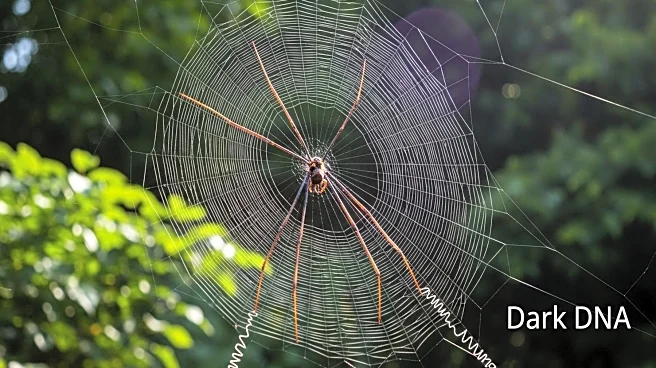What's Happening?
Researchers are examining the unusual DNA of Australia's peacock spider, which may hold the key to understanding diverse evolution. The peacock spider, known for its vibrant colors and dance moves, has evolved into 100 different species, a number significantly higher than most animals. Scientists are focusing on the spider's 'dark DNA,' a mysterious part of its genetic material, which might explain its rapid adaptation and species diversification. Jonah Walker from the Sanger Institute, along with Dr. Joana Meier and an international team, is studying the spider's behavior, movement, and songs, cross-referencing these traits with their DNA to identify genetic links. The research is in its early stages, but the team is optimistic about uncovering significant findings.
Why It's Important?
The study of the peacock spider's 'dark DNA' could revolutionize our understanding of genetic evolution and adaptation. If researchers can determine how these spiders have diversified so extensively, it may provide insights into the mechanisms of evolution applicable to other species, including humans. This research could impact fields such as genetics, biodiversity conservation, and evolutionary biology, potentially leading to new strategies for preserving endangered species and understanding genetic diseases. The findings could also contribute to the Earth BioGenome Project, which aims to decode the DNA of all living species, enhancing our knowledge of life's interconnectedness.
What's Next?
The research team plans to continue their investigation into the peacock spider's genetic makeup, aiming to identify specific genes responsible for its diverse traits. The Earth BioGenome Project, which has already deciphered the DNA of 3,000 species, aims to decode 10,000 species next year and all 1.8 million living species within a decade. This ambitious project could provide a comprehensive understanding of evolutionary processes and genetic relationships across species, potentially leading to breakthroughs in science and medicine.
Beyond the Headlines
The exploration of 'dark DNA' raises questions about the ethical implications of genetic research and manipulation. Understanding these genetic components could lead to advancements in genetic engineering, posing challenges in terms of biodiversity conservation and ethical considerations in altering natural evolutionary processes. The study also highlights the cultural significance of biodiversity and the importance of preserving unique species like the peacock spider, which contribute to the ecological balance and cultural heritage.









